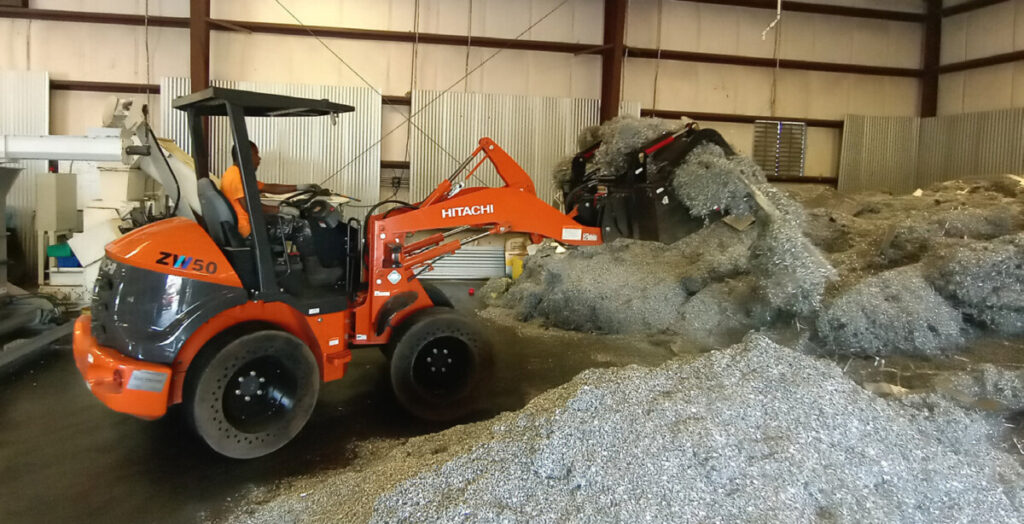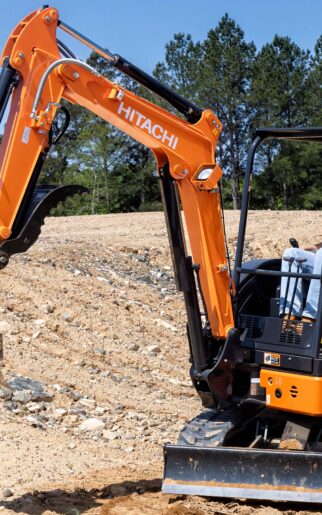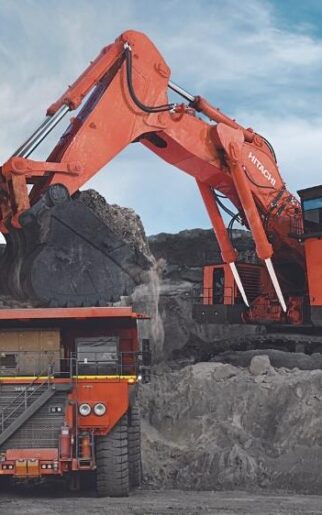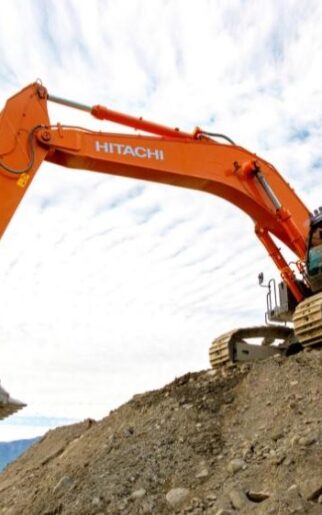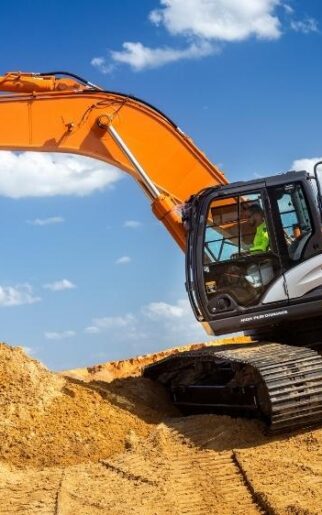Pasco Iron and Metal’s Successful Switch to a Hitachi Compact Wheel Loader
Pasco Iron and Metal switched from a skid steer to a Hitachi ZW50 compact wheel loader to create a cleaner, safer, and more productive work environment.
After learning the trade from his father, Matt Goldman started Pasco Iron & Metal in 2007 with just three employees. Today the Land O’ Lakes, Florida, company has grown to employ 50 people. Across its two locations, Pasco operates a fleet of nine trucks, six cranes and five skid steer loaders. Crushers and processing equipment bang away at mountains of incoming and outgoing scrap metal all day long.
“We have two full-time mechanics and one full-time welder and could use two more mechanics,” Goldman says. “But having control over our transportation gives us an advantage over most of our competition. We pay a little bit more for maintenance and service, but that control adds value. And the customers love the service.”
Recycling big time
Pasco recycles a wide variety of metals including iron, stainless steel, aluminum, copper, nickel, brass, and lead. Along with their second location in Largo, they buy old appliances, radiators, batteries, wire, circuit boards, aluminum shavings and all sorts of industrial size lots of scrap metal. The material is dumped in the yard and then processed, typically crushed, or melted into ingots and then sold to companies that will use it to make new products.
In 2013 the company added a railroad spur and started leasing rail cars to deliver large shipments of scrap iron to the ports and other rail terminals. On an annual basis, Pasco Iron and Metal ships 40,000 tons of steel and iron, the equivalent of 500 rail cars. Nonferrous shipments, copper and aluminum primarily, run about 24 million pounds a year.
Taking delivery of this material, processing it, and then loading it onto trucks and railcars and shipping it out again makes for a very busy yard. It’s kinetic, noisy, and nonstop.
Aluminum rain
One of the most challenging jobs in the company is loading aluminum turnings. These are fine strands of aluminum that come off lathes and milling machines, and Pasco regularly receives and processes tons of it. The problem is that when loading these turnings with a skid steer, the bucket is so close to the operator that he invariably gets littered with stray shavings as he dumps the bucket into a truck.
These shavings wind up accumulating in the operator’s lap and pile up so deep in the footwell of the cab that it becomes hard to work the pedals. Operators crawl out of the cab at the end of the day with hundreds of tiny bits of aluminum turnings clinging to their clothing and boots.
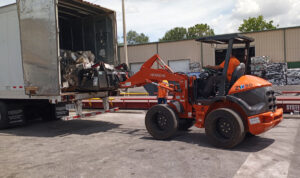 Better way to load
Better way to load
Pasco Iron and Metal decided to try a Hitachi ZW50 compact wheel loader, not only to keep the cab and operator away from the aluminum spillage, but to see how it competed against skid steers in terms of productivity and operating costs.
They didn’t have to look far. They already enjoyed a good relationship with Great Southern Equipment, the local Hitachi dealer, and had bought several cranes from them.
“We called Steve Tuton, our salesperson at GSE, and told him, ‘We know you sell these. What can you do for us?’” says Jimbo Jennings, operations and dispatch manager. “And we got it worked out. We didn’t even look at another one, because of what Steve had to offer.”
“The operator can see more around him on the ZW50. He can see where he is loading. And it has a bigger bucket and can handle more volume than a skid steer”
– Matt Goldman, founder of Pasco Iron and Metal
So far, Pasco operators have had just a few weeks on the Hitachi compact wheel loader, but they like it, Jennings says. With the longer wheelbase the bucket is far enough in front of the cab that stray shavings fall to the ground instead. “It’s working well for them,” he says. “Not only are the operators and the cab staying clean, but the compact wheel loader has a bit more power than the skid steers.”
Right-sizing the machine
Choosing the size of loader was something Pasco did debate. Hitachi offers one size smaller, a ZW30, and plenty of loaders larger than the ZW50. But the ZW50 met all the important criteria.
“The ZW50 isn’t that much bigger than the ZW30 but it has more power and lifting capacity,” Jennings says.
Visibility is another plus. “The operator can see more around him on the ZW50,” Goldman says. “He’s not in a box. He can see where he is loading. And it has a bigger bucket and can handle more volume than a skid steer.”
What’s more, Goldman wanted a machine that could withstand the rigors of the scrapyard. “That’s my biggest challenge,” he says. “We don’t want to be putting out maintenance fires all the time, he says. “If you have a machine down, you’re dead in the water. You’re not going to get those hours back.”
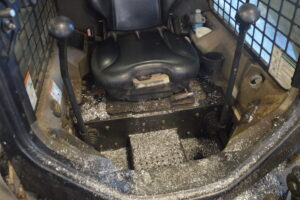 Skid steer vs. compact wheel loader costs
Skid steer vs. compact wheel loader costs
As far as skid steers versus compact wheel loaders, Goldman cites several operating cost advantages. One immediate gain is reduced tire wear
on the expensive solid-rubber tires necessary in scrap yard operations.
“Since it isn’t skidding all day long, the tires should last a lot longer with the articulated steering,” he says. “On our skid steers we’re replacing tires once a year.”
Pasco also had good reason to want a long-lasting machine. Metal scrap yards are some of the most brutal environments a machine can encounter. “We get about five years out of our skid steers, but we should be getting 10 or 12,” Goldman says.
And while compact wheel loaders offer plenty of power, they typically have smaller engines than similar-capacity skid steers. A skid steer puts a lot of its engine power into turning and moving the machine around. The Hitachi compact wheel loader, on the other hand, has an axle, articulated steering, and a differential. This makes maneuvering more energy efficient and frees up additional power for the hydraulics. There’s less load on the engine and as a result, lower fuel use and longer engine life.
A compact wheel loader is initially more expensive than a skid steer, but Goldman says the expectation is that it will be more productive, hold up better and deliver lower operating costs over time.

